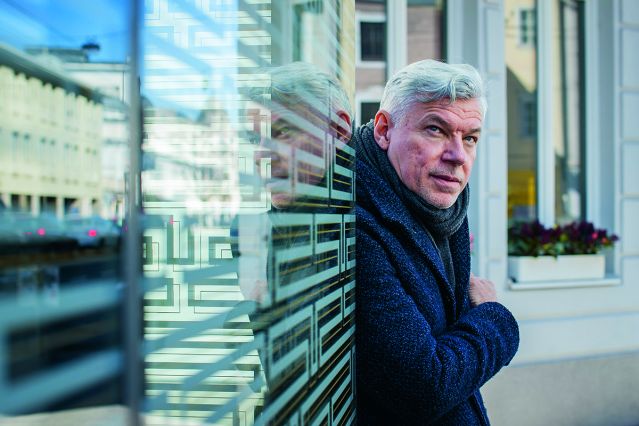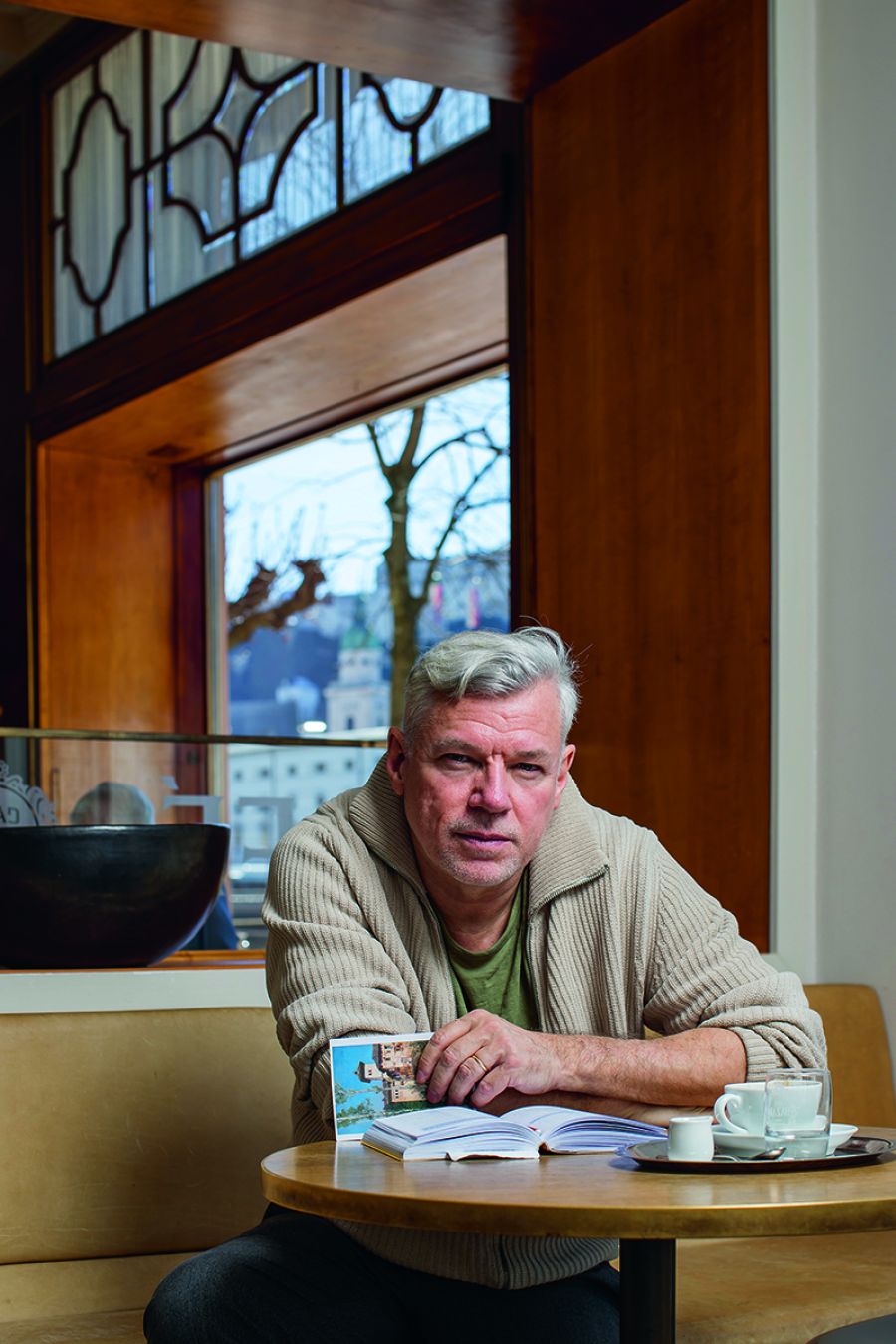Christof Loy … Mein Seelenort: Das Café Bazar in Salzburg - Deutsche Oper Berlin
Christof Loy … My happy place: the Café Bazar in Salzburg
Christof Loy thinks more clearly when he’s around people. The director watches the goings-on around him at a café in Salzburg, and ponders his production of FRANCESCA DA RIMINI
My happy place is the solarium at the Café Bazar in Salzburg. It’s important that I specify that, because only in the glass room connecting to the art nouveau building of the café itself can I feel myself in the here and now. Unlike the solarium, flooded with light, the interior of the main room imparts the traditional charm of Austrian coffee house culture, with old wood panelling on the walls, classical wicker chairs, marble tables, and the large chandeliers hanging from the ceiling. I like the idea of feeling connected to this tradition, but also passing through it and leaving it behind me so that I can live in the present.
I prefer to come here in the morning, around 10:30, and find a seat where I can look out through the large glass façade. I can feel the actual café, old Salzburg itself, right behind me – but I sit in the more geometrical, sober, modern part of the building, and when I look up I can see the Museum der Moderne towering 60 metres above the old town on the Mönchsberg. In the solarium of the Café Bazar, I’m connected to time and history, and feel myself protected by everything behind me while I look forward into the present and future. The Salzach flows past just a few metres from where I’m sitting, as we’re right on the promenade. Although I can’t hear the river, I feel the unceasing movement of the water, constant and gentle. This, too, shows me that we are always in motion.
.

I feel a cosy pattern to the chaos here, and this is exactly the type of environment in which I can concentrate extremely well. I can read, study, take notes, and reflect here, and all the better when I can sense life happening around me. It’s been that way as long as I can remember, and I have always sought out places where I can watch people and where their voices become part of a familiar background noise.
That’s important to me, too: There is no music at the Café Bazar, and the sounds that I hear here are in the present, created in this place at this moment. The fact that I’m so used to and enjoy public spaces probably stems from my lack of a driving licence. I’ve never experienced this type of special environment on some lonely motorway, where you’re entirely shielded away from the outside world and are more contained within yourself.
I don’t plan my visits to the Café Bazar. If I’m free on some morning and the sun is still shining, I don’t even ask what I should do with my time – I automatically go to the café and sit in the solarium. I always have something to read and my notebooks on hand, one in which I write down my general ideas and thoughts, and another for the piece I’m currently learning. That word seems appropriate for what I do with my books and notes here: I learn my pieces.
Austrian coffee houses have their own bio-rhythm, and its function changes throughout any given day – as do the moods of the guests. In the morning you go to one of the big newspaper stands to learn about what happened that day and around the world. At midday, you speak more with other people, especially about what you read in the morning. And in the early evening the intellectual merges with a sort of sensory pleasure, and it’s time to indulge in the delights of the coffee house. These forms of free gathering and meeting are probably helped by the fact that, at an Austrian coffee house, you can sit back with one or two cups of coffee without being disturbed by a waiter. I usually order a “large brown” as it’s called here, meaning a double espresso with a shot of milk.

When, at the Café Bazar, I think about the characters in my pieces, develop them, and slowly let them take shape in my head, that mainly comes from within myself. I don’t have any specific models that I base them on, but rather draw back on my own experiences that I’ve gained with other people, watching them, interacting with them, empathising with them. When I think that I’m familiar enough with a character, I’m usually surprised during the first rehearsal. This was especially true in the case of FRANCESCA DA RIMINI, which we’re finally able to perform in front of an audience after the live stream we did because of the coronavirus pandemic. I have a nearly ghostly connection with Sara Jakubiak, who sings the role of Francesca, as she intuitively discovers aspects of a character that were unknown to me. Although we’ve known each other for a long time and have a strong working relationship built on trust, a real internal connection, we’re almost cautious around each other in private. It’s as though we’re trying to play our hands close to our chests for the things yet to come. When we recently rehearsed DAS WUNDER DER HELIANE, in which The Stranger is a lead role, she suddenly said to me, “Christoph, you’re my Stranger.”




